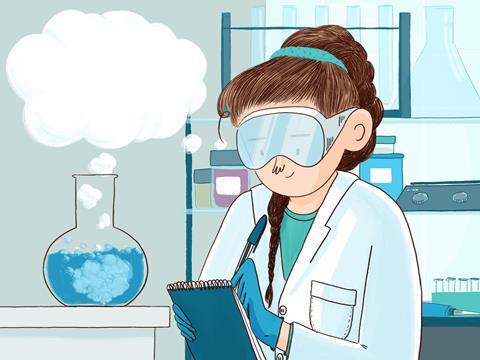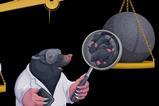Developing the tools of reasoning helps students uncover scientific truths
‘Science, for humans, is the most powerful way of discovering truth about the world.’ But how does science have this power, and how can students develop the tools of reasoning to allow them to go on and discover new scientific truths in future?
Forms of reasoning
Since Aristotle, philosophers have distinguished between deductive and inductive reasoning. Both are important tools of scientific reasoning, but by explicitly distinguishing the two, we can help students understand and evaluate the claims made by scientists, as well as their own claims on the basis of their practical work.

Deductive arguments
Let’s start by looking at an example of a deductive argument:
Premise: Chlorine is more reactive than bromine.
Premise: Bromine is more reactive than iodine.
Conclusion: Therefore, chlorine is more reactive than iodine.
The argument above is valid: if the premises are true, then the conclusion must be true. Deductive arguments are ‘truth-preserving’.
Much chemistry teaching relies on students’ deductive reasoning. For example, when teaching students about the reaction between alkenes and bromine water, we might tell them that alkenes decolourise bromine water, show students a different molecule and ask them to identify if it is an alkene, and then ask them if it will decolourise bromine water. This is asking them to apply a simple deductive argument:
Premise: If an alkene is added to bromine water, the solution will decolourise.
Premise: Pent-2-ene is an alkene.
Conclusion: Therefore, if pent-2-ene is added to bromine water, it will decolourise.
The challenge in chemistry (and science in general) is showing that the premises are true. How can we prove (beyond reasonable doubt) that chlorine is more reactive than bromine, and alkenes decolourise bromine water? This takes some inductive reasoning.
7 simple rules to boost science teaching
Click to expand and explore the rules
Build on the ideas that pupils bring to lessons
Help pupils direct their own learning
Use models to support understanding
Support pupils to retain and retrieve knowledge
- Pay attention to cognitive load—structure tasks to limit the amount of new information pupils need to process
- Revisit knowledge after a gap to help pupils retain it in their long-term memory
- Provide opportunities for pupils to retrieve the knowledge that they have previously learnt
- Encourage pupils to elaborate on what they have learnt
Use practical work purposefully and as part of a learning sequence
Develop scientific vocabulary and support pupils to read and write about science
Use structured feedback to move on pupils’ thinking
Inductive arguments
This is where practical work becomes critical: inductive arguments are ‘knowledge-generating’, generally drawing on experimental findings. For example, the following demonstration inductively supports the claim that chlorine is more reactive than bromine:
Premise: When I react iron with chlorine, it reacts more vigorously than when I react iron with bromine
Conclusion: Chlorine is more reactive than bromine
As it stands, it’s a very weak argument. Repeating the experiment and getting the same result would be a way of supporting the conclusion. But, it’s not the only way, and it can be problematic. If the reactivity of aluminium were claimed on the basis of reacting metals with acids, it would be in the wrong place in the reactivity series.
So, how else can we support the claim? Generally in a chemistry lesson, we use a range of distinct experimental evidence: we would supplement the iron demonstrations with a class practical on displacement reactions of halogens. The two experiments giving the same conclusion provides much better confirmation.
We can strengthen the premise even further by showing the same result can be predicted using theoretical ideas which work in other situations. By considering the strength of the electrostatic force of attraction between the outer electron and the nucleus, students can predict that more energy is released when chlorine gains an electron than when bromine does. And students should be encouraged to assess their experimental findings against their understanding of the underlying theory.
Practical reasoning
This suggests students’ scientific reasoning can be developed through encouraging them to interrogate their practical work effectively.
Firstly, students can be asked to evaluate valid and invalid deductive arguments, and correct incorrect ones so that the claims made are true. Developing this form of reasoning is critical for the study of chemistry as well as many other things.
But secondly, and more importantly, students should be challenged to evaluate the claims they make of their own practical work in terms of the criteria discussed:
- How many times have they repeated the experiment? Are they confident of the result or is it an anomaly?
- How could the claim be investigated by doing a different practical investigation to test the result?
- How well can the results be explained using their theoretical understanding of chemistry: are their findings consistent with what the theory would predict?
By asking the right questions, and modelling how to interrogate scientific claims, you will ensure that your students develop the tools generate defensible scientific claims in the future.
This article is part of the series 7 simple rules for science teaching, developed in response to the EEF’s Improving secondary science guidance. It supports rule 7d, Make sure pupils can respond to your feedback.















3 readers' comments